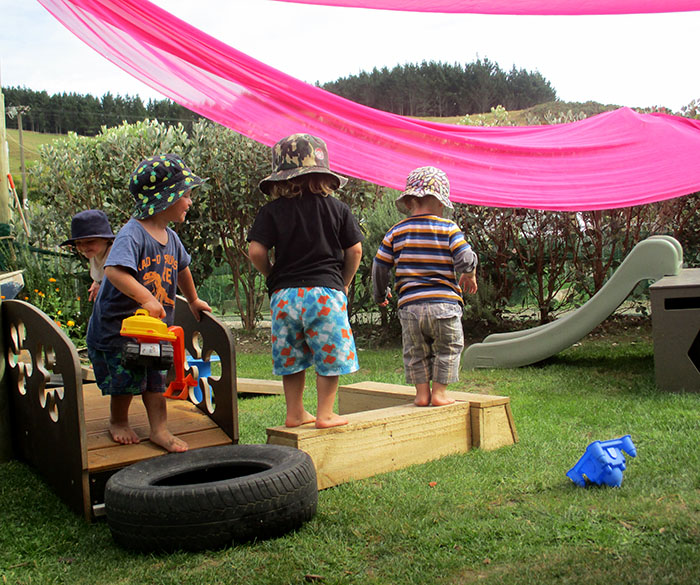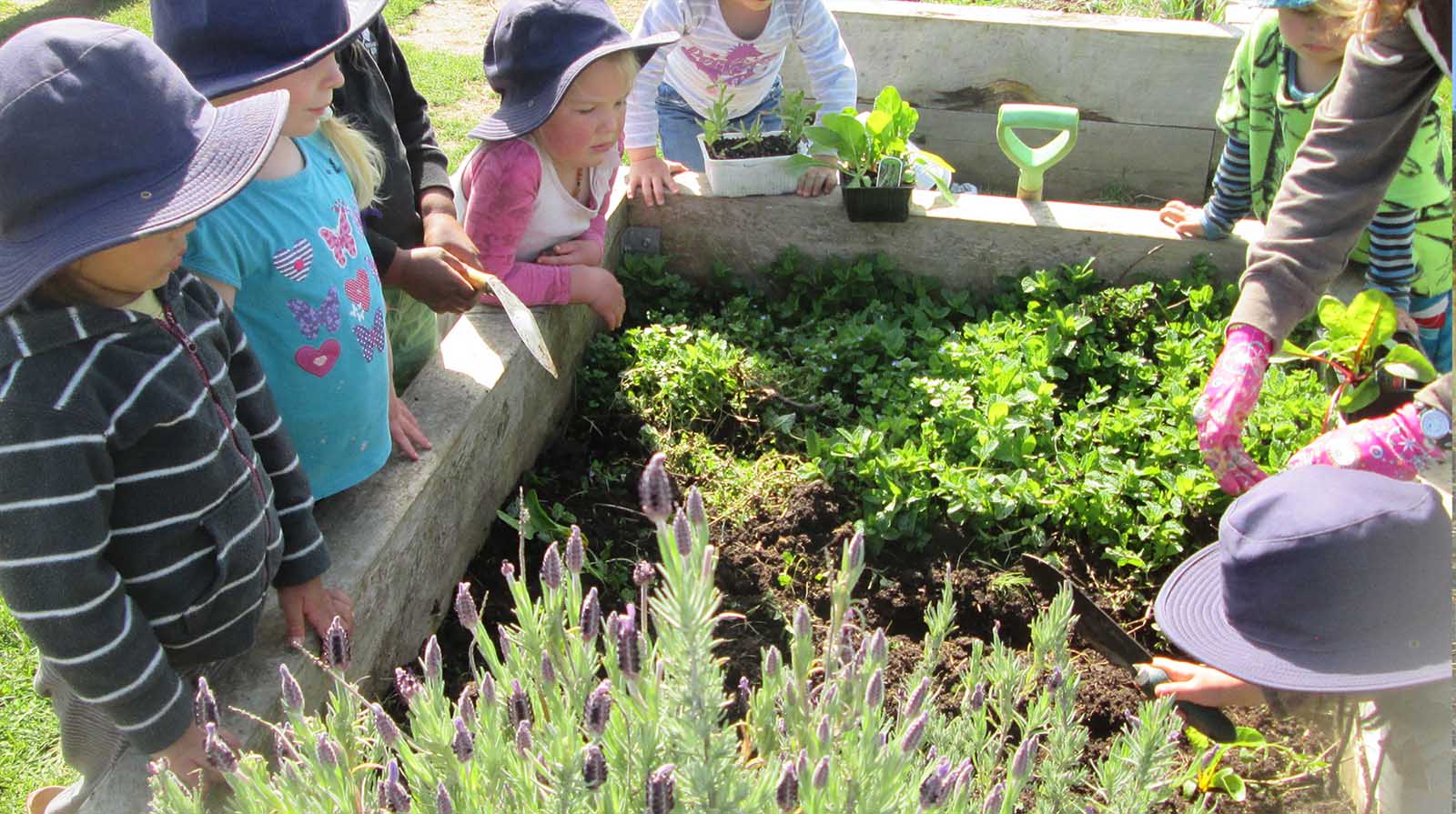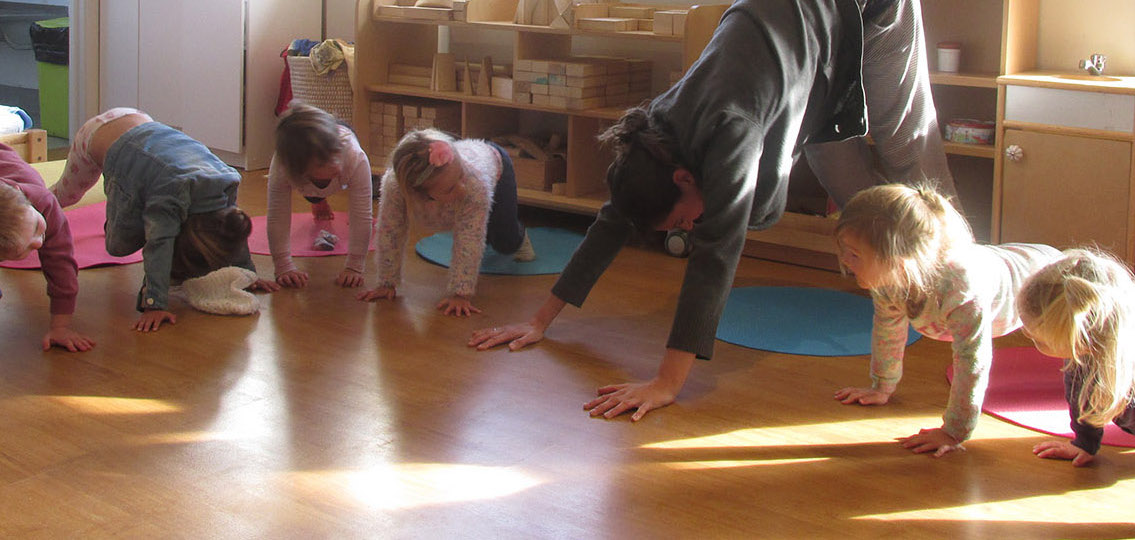LEARNING SPACES

Tiaki Room 0 – 2 years
The Tiaki programme is responsive to the individual needs of the children attending each day. With this age group each child has a unique routine that we endeavour to uphold where possible. The programme is based on maintaining a nurturing environment that is supportive to each baby’s individual need. In these very early stages of a child’s life, it is paramount to make sure that children feel secure and comfortable in their surroundings. Supporting children to develop a strong sense of belonging and develop relationships with their Kaiako and peers is our priority.
Being able to move freely between the indoor and outdoor spaces is an essential aspect of the Tiaki room philosophy. The children will participate in a wide range of experiences both indoors and out. The children take part in experiences to meet all developmental areas such as music, singing, painting, push pull toys, manipulation materials, blocks, storytelling, puppets, sensory resources and more.
Communication (verbal and non-verbal) is a strong part of the programme as this enhances a growing vocabulary and lays the foundation for the child as they move through into the Tangaroa and Karioi room.
Tangaroa Room 2 – 3.5 years
In this age group we continue to build and consolidate on learnings from previous years and begin the gradual transition to a more structured programme, ready for the preschool room and eventually the progression to primary school.
Learning through play and meaningful interactions are the main focusses for this age group. We set up a range of daily activities based on children’s interests and needs. Baking, messy play, playdough, water, small worlds, music, dance, stories and lots of opportunity to challenge their physical abilities are some of the activities that we provide.
Children in this age group are grappling with big emotion and social competency concepts. While children are learning to manage their emotions and develop social competency skills, we ensure kaiako are close by to support children. Teachers will do this is through modelling and supporting children to talk about how they are feeling, effectively communicate, listen to others, share ideas, take turns, show kindness and respect for others and our environment.
Starting to learn self-help skills such as using the toilet, washing hands, getting dressed, asking for help and being responsible for belongings are also skills that are encouraged in the Tangaroa room.
Small mat times are introduced in this room as an opportunity to engage in story time, music/dance, practice listening skills and being part of a group activity.
The Tangaroa programme is continually reviewed to meet all children’s learning needs and respond to their individual and group interests. Themed play areas are set up in response to children’s interests as a way to encourage further learning in an area of interest.
Karioi Room 3.5 – 6 years
The programme that children are introduced to at this age places more emphasis on providing challenging activities that provide tamariki with opportunities to expand their knowledge, experiences and skills. The programme also aims to support children to explore strategies and skills they will need as they transition into school.
Being school ready is about being socially competent, self-regulated, self-sufficient and being excited about the next step in their learning adventure. In the Karioi room each child will be supported in becoming a competent and confident learner who is capable of leading their own learning and development. This is achieved through a mixture of child lead activities and plenty of opportunity to play. As our programme is child lead, we have lots of resources available should children wish to pursue more traditional areas of learning such as reading, writing, maths and science.
The programme and resources available are designed to enhance creativity and expand children’s life skills. Spontaneous mat times that are inspired by the children’s interests give tamariki the opportunity to participate in a wide range of creative movement, waiata, story telling and the sharing of news from home. The children are supported through their play endeavours and are encouraged to work together as a team. The children take part in small and large group experiences and each day undertake tasks that present meaning and purpose. These tasks are known as ‘real jobs’ in the Karioi room where tamariki have the opportunity to help kaiako and peers to maintain our vegetable gardens, care for our animals, setting up/tidy up kai tables and support at tidy up time.



Activities

Meditation as a daily ritual and an integrated part of our curriculum: We view meditation as a valuable tool to support children’s learning about their physical, emotional and spiritual selves. We understand the link between each dimension of holistic development and how meditation can have a profound effect on cognitive development. Meditation in the early years supports the development of self-awareness, self-regulation, compassion and empathy for others, understanding of feelings and emotions, awareness and skill in bodily relaxation, and reduces anxiety and stress. Finding time to just be, tap into oneself, relax and concentrate on the here and now can be challenging and a practice that is often left out of our daily lives. The intention is that the children turn their awareness inward and notice their breath, how they are feeling physically and emotionally. We understand that when a child learns to calm their survival brain, the frontal cortex is given more resources to activate.
Our Outdoor Programme: The Karioi room go on regular weekly excursions to Kura Taiao to spend the afternoon in nature without our usual resources. Running free at Kura Taiao with little added resources has many wonderful learning outcomes for children such as encouraging children to use their imagination and creativity, think outside the square, be inventive, and explore and experiment with the natural found materials around them. With little stimulation from resources, children stop, notice the wonder around them and challenge themselves. There are trees to climb, long grass to sit in and a tidal stream and many birds to observe. While we are at Kura Taiao we support children to challenge themselves and develop physically, socially and emotionally. We notice wonderful learning dispositions emerge around social competency, creativity, kaitiakitanga, self-regulation and observation. The children are also supported to learn about keeping ourselves and each other safe as we navigate the driveway and carpark getting there.
OUR ENVIRONMENT

At Let’s Grow we are proud of our premises. Our unique outdoor environment gives children the opportunity to explore nature first hand. Children can jump in puddles, observe insects, care for our animals, climb on logs, and plant their own vegetables.
Nature at our doorstep
We feel very blessed to be surrounded by the best that nature has to offer. Just a stones throw down the road is Ngarunui Beach. Just over the fence from Let’s Grow is our outdoor education area, you’ll often find us there building structures or gazing over the beautiful estuary.
